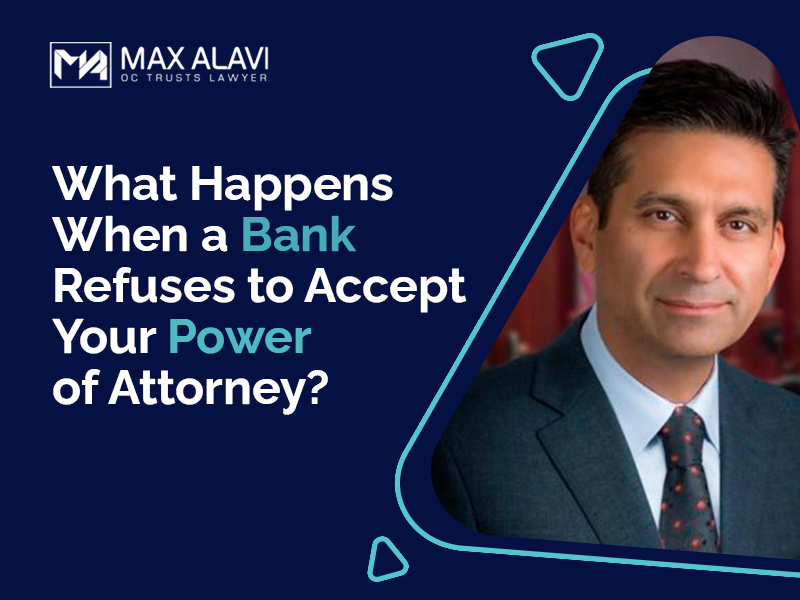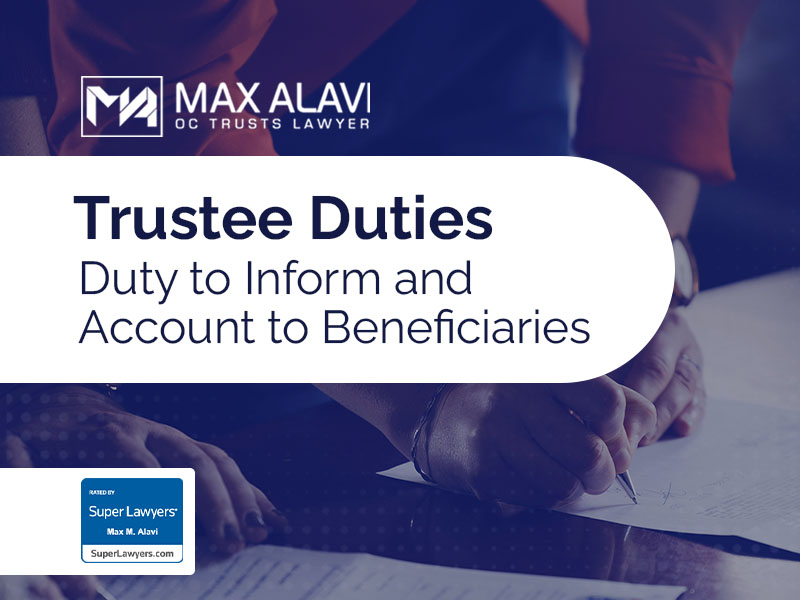A financial power of attorney authorizes a loved one to manage your finances and to conduct business transactions on your behalf, should you become unable to handle those matters yourself. But what happens when a third party, such as a bank or credit union, refuses to acknowledge a properly executed power of attorney document? This may result in significant hassle and frustration, but California law provides a structure to make a claim against those third parties and even to recoup legal fees. The first step? Talking to a skilled living trust lawyer. Find out more in this post from Max Alavi APC, OC Trusts Lawyer.
What Happens When a Bank Refuses to Accept Your Power of Attorney?
The financial power of attorney is one of the most valuable estate planning documents, allowing you to ensure that your financial wishes are carried out, and your duties fulfilled, even if you become incapacitated for some reason. More specifically, a financial power of attorney is a document that lets you name someone as your agent, authorizing them to manage your finances when you’re unable to do so yourself.
At the office of Max Alavi APC, OC Trusts Lawyer, our attorneys have received a number of inquiries from clients who say that a bank or credit union has refused to recognize their legitimate financial power of attorney. In this post, we’ll share some insight.
Financial Power of Attorney Denial: A Case Study
There are several reasons why a financial institution might look askance at your valid power of attorney document, but typically the situation unfolds like this: Imagine a woman by the name of Mary. She’s listed as her mother’s power of attorney. What this means is that, legally speaking, Mary is authorized to conduct any kind of financial or business transaction on her mother’s behalf, particularly if her mother becomes unable to handle those transactions on her own. And that’s just what happens: Mary’s mom is diagnosed with dementia, and has doctors’ notes to verify it.
A dementia diagnosis is always tragic, but Mary decides to do her best to make certain her mom gets the highest standards of care. She places her mother in a residential care facility that offers around-the-clock nursing and other support services.
Of course, these communities can be pricey. To cover the significant expenditure, Mary decides to draw from some of her mother’s bank accounts and investment portfolios. This is something that, as a financial power of attorney, she feels she is authorized to do.
And so, Mary reaches out to her mother’s bank, providing both the financial power of attorney document and the doctors’ notes, verifying the dementia diagnosis. Mary doesn’t hear back for weeks, and when she finally does get in touch with someone from the bank, they give frustrating news: They claim that the power of attorney document is too old, and thus they cannot recognize its legitimacy.
If the story ends there, and Mary simply settles for the bank’s verdict, then she is left with no way to cover her mom’s assisted living and dementia care expenses. Thankfully, Mary has other options available to her.
The Answer: Talk with a Living Trust Attorney
The scenario we’ve outlined here is all too common, but thankfully, there are legal remedies in place. For example, under California Probate Code § 4406, Mary is authorized to file suit against the bank for not recognizing the validity of a properly executed financial power of attorney document. And if the courts determine that the bank acted unreasonably, the law further authorizes Mary to recoup all attorney’s fees, which may place her back on solid footing, financially.
To succeed in a case against a bank, of course, you’ll need to match their resources and legal expertise. That means enlisting the services of a skilled living trust attorney who focuses on power of attorney and living trust law. Max Alavi APC, OC Trusts Lawyer, has an extensive track record working on cases just like this one, and a portfolio of reviews that speak to his excellency and his consistency in getting results.
Speak with a California Living Trust Attorney Today
Our firm is here to help you with any crises or conflicts that emerge over your estate planning documents, including a financial power of attorney dispute. To speak with a lawyer today, contact Max Alavi APC, OC Trusts Lawyer directly.






